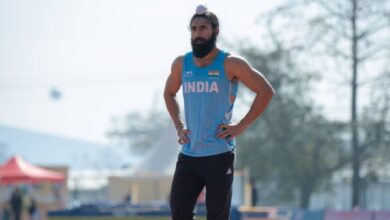Mohammad Haris: A fearless six-hitter, Mr Google, Mohammad Yusuf lookalike

Inside a congested room of the Maazullah Khan Cricket Academy in Peshawar, a group of middle-aged men were scattered around a television set. Their shining eyes were fixed on a stubbled young man on the screen. He was fidgeting with his helmet, rehearsing his shots, tapping the turf a few times, as he waited breathlessly for the bowler to steam in.
The moment arrived. Mohammad Haris, whose batting was the sole interest of the group, drove the first ball firmly to the extra cover fielder. Among the watching group was Pervez Khan, Haris’ childhood coach who narrated to The Indian Express how it was to watch his ward take on some of the fastest bowlers in the world on the biggest stage.
“He looks in good touch, the feet are moving well,” Khan remembers telling his friends after the first shot. One of his colleagues asked him: “Chhakka kab aayega (when will he hit a six), sir?” But even before Khan could answer, he saw Wayne Parnell’s ball blast onto his former ward’s helmet.
Haris stood shellacked. He forced a smile at skipper Babar Azam at the non-striker’s end. The on-air commentators were wondering whether he was blooded too soon into the team. Until the day before, he was just a reserve. But as he went through the mandatory concussion tests, the coach whispered to himself: “See how he responds.” And he stoutly told his colleagues: “Abhi ayega chhakka (now, he will hit a six).”
On cue, Haris whipped the next ball, from Kagiso Rabada, imperiously for a maximum.
As everyone sat mesmerised the stroke, he unpacked another glorious flicked-six. Moving across and just whirling the fearsome bowler over fine-leg. Before the coach could even begin celebrating, he pummelled Rabada for another boundary, a ferocious pull. The coach just stood awe-struck. “I know his potential, but watching him play those strokes against one of the best fast bowlers in the world, I was lost for words,” he told this paper.
However, what had made the coach predict his ward’s response was no sixth sense, but a deep understanding of his game and mind. His memory rolled back. Khan still remembers a confident young boy at the doors of the academy in the Arbab Niaz Cricket Stadium. “He told me he had not played with a hard ball. But he did not show any fear when he faced the hard ball for the first time. He looked totally natural; good eyes and hands,” he recalled.
The naturalness is evident. Haris’ strokes are neat and fluent. There are no awkward or extravagant movements. He is seldom in two minds; rarely premeditates, or loses his shape when playing the strokes, and has a sparkling clarity of mind. In many ways, he is reminiscent of a young Mohammad Yousuf.
Hard work behind success
The naturally-endowed gifts, though, were carefully nurtured, as only Pakan cricket could, without trampling on the original. “He used to wicket-keep too, and so we worked a lot on his fitness. He was always willing to work extra hard and would always be at the academy,” Khan said.
Years later, Pakan fielding coach Abdul Majeed would say the same: “Whatever task Haris is given as a ‘keeper, a batter or a fielder, he has the ability to accomplish it with the utmost dedication. He frequently asks me to conduct the most demanding sessions in order to enhance his skills as a fielder.”
The journey to the national side, though, had once looked tedious. At one stage, even the academy seemed far. It was an hour from his home in Mushtarzai, a quaint village near the Buddh ruins of Takht-i-Bahi. Haris’ mother was reluctant to send him to a cricket academy, fearing it would affect his academics. But his father convinced her of the possibilities of being a good cricketer.
“My mother wasn’t too keen about me playing cricket and would scold me for that. But my father had no problems as he knew that people can make a big name in this game in the same way that the likes of Aamir Sohail and Wasim Akram had done. But I promised my mother that I would not compromise on my academics. And I did join college,” Haris told pakpassion.net.
Three years on, the year he joined college, Haris was picked for the Peshawar U-19 team; a year later, he progressed to the U-19 national team. His first tour, to Sri Lanka was underwhelming, as he scored just 82 runs in four youth ODIs. But the selectors persed with him for the South Africa tour. He repaid the faith with three fifty-plus scores in seven games, and was twice adjudged player of the match.
“Everything seemed like a dream, everything happened so fast,” he would say in that interview. It was only a matter of time before Pakan Super League franchise Peshawar Zalmi sought his signature. Khan was not surprised. “He has talent, and that would take him only higher,” he said.
At the academy, Haris is projected as the perfect role model. “He is humble. After his debut match for Pakan, he came to the academy and gifted us his jersey,” Khan said. The piece of cloth he would treasure for a lifetime.
********
During his U-19 days, Haris got a peculiar nickname. Mr Google. He proudly explains the reason. “Kyunki mere paas knowledge zyada hain (Because I have more knowledge)! I have answers for everything. Whatever they (teammates) ask me, I would give them every bit of information. I liked to do research about every topic and update my knowledge,” he told Zalmi TV.
Pakan’s Mohammad Haris bats during the T20 World Cup cricket match between Pakan and South Africa in Sydney, Australia, Thursday, Nov. 3, 2022. (AP Photo/Rick Rycroft)
In that interview, Haris was asked who his favourite batsman was. “Jos Buttler.” The interviewer followed up: ‘Do you want to be like him?” He replied with a stern face: “I want to be myself. I don’t want to be like someone, because I consider myself as the best.”
So confident of his skills that after he smashed a 32-ball 70 against Islamabad United in just his second PSL game, Haris held aloft a bracelet with the words #BeTheBest. Whenever he tweets, he uses this hashtag too. “I value fearlessness and consider it to be a central trait of my personality. This is what my parents have taught me,” he would explain.
It’s this fearlessness that has catalysed Pakan’s turnaround in the T20 World Cup. His 11-ball 28 against South Africa and 18-ball 31 versus Bangladesh have been the sort of momentum-fuelling knocks that Pakan had been frantically searching for. “He is what you see, a confident young man, who believes he can do anything on a cricket field,” his coach chimed in.
Suddenly, from being a reserve player, Haris has become an indispensable batsman for his team. So much so that many pundits want him to open the innings. “We need firepower at the top with batters who are showing clear intent like Haris,” Shahid Afridi tweeted. Waqar Younis is convinced that nobody in the Pakan team understands T20 cricket as much as Haris does.
The sudden parachuting into the limelight has not dazed or dazzled him. He takes it normally, as though he were ordained for it. Not arrogance, just immense self-belief. After the Bangladesh game, he exuberantly joined the fans outside the stadium for celebrations, patiently signed autographs and posed for selfies, and obliged interview requests to a pack of youtubers from Pakan, one after the other.
One of them asked him. “How do you feel?” He replies: “I feel normal.”
“Nervous tha?” “Kya nervous?”
Even when he was struck flush on the helmet, he didn’t betray nerves. It’s Haris’ bravado, as much as the strokes, that has value-added to Pakan’s renaissance. Or #BeTheBest attitude.







